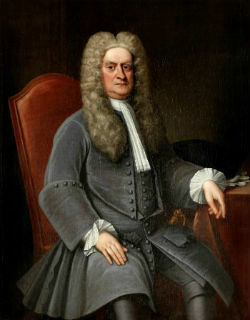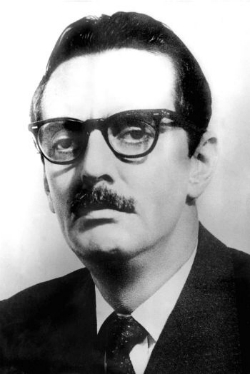Isaac Newton was an English scientist, philosopher, physicist, mathematician, astronomer, alchemist and theologian.
A multifaceted figure, he was one of the greatest scientists in history. He left important contributions, mainly in Physics and Mathematics.
Its rigorous method of experimental investigation, coupled with a precise mathematical description, has become a model of investigation methodology for the sciences.
Famous for his "Law of Universal Gravitation", he further enunciated the Laws of Motion. He described optical phenomena: color of bodies, nature of light, light decomposition.
He developed differential and integral calculus, an important mathematical tool used in different areas of knowledge. He was also the first to build a reflection telescope, in 1668.
Biography

Isaac Newton was born in Woolsthorpe-by-Colsterworth, a small village in England, on January 4, 1643. In the Julian calendar, adopted in England at the time, his birth date is December 25, 1642.
He was baptized with the same name as his father, who had died a few months before his birth.
As his mother, Hannah Ayscough Newton, remarried and moved to another city, he was left in his grandmother's care.
When his stepfather died, he returned to live with his mother and was encouraged to take care of the family's land. However, he showed no aptitude for the task.
In 1661 he entered Trinity College, Cambridge. Although the curriculum at Cambridge was based on the philosophy of Aristotle, Newton devoted himself to the study of several authors linked to mechanical philosophy.
read the book Dialogue from Galileo Galilei, the works of philosophy by René Descartes, he studied Kepler's laws on the planetary system and many other authors.
He graduated with a Bachelor of Arts degree in 1665. In that same year, England was ravaged by the plague and several establishments were closed, including the University of Cambridge.
So Newton was forced to return to his farmhouse. In this period of isolation, he had the opportunity to seek solutions to all the questions he had begun to ask from his studies at Cambridge.
At that time he developed the method of infinite series (Newton's binomial) and the basis for differential and integral calculus.
He experimented with prisms, which led him to color theory and began to develop the reflection telescope.
He also studied circular motion and analyzed the forces related to this motion. He applied this analysis to the motion of the moon and planets relative to the sun. Which would be the basis for the Universal Law of Gravitation.
Returning to Cambridge in 1667, Newton became a professor and in 1669 he was promoted to Lucasian professor of mathematics.
He was elected a member of the Royal Society in 1672 and despite the admiration he aroused, his withdrawn temper and difficulty in receiving criticism made him reluctant to publish his works.
Despite this, in 1687 he published his most famous book Philosophiae Naturalis Principia Mathematica (Mathematical Principles of Natural Philosophy).
He also performed activities outside academia. In 1696 he was appointed superintendent of the Mint and in 1699 he was appointed director of the Mint.
In 1703, Newton is elected president of the Royal Society, accumulating the presidency with the function of director of the mint.
he published Optics, in 1704, which reached a large audience thanks to a more accessible language. In 1705 he was knighted by Queen Anne, being called Sir Isaac Newton.
He died in London on March 31, 1727 due to kidney problems.
Newton's Laws
the three Newton's Laws are theories about the motion of bodies described by Newton at the end of the 17th century, namely:
- Newton's First Law: Principle of Inertia
- Newton's Second Law: Principle of Dynamics
- Newton's Third Law: Principle of Action and Reaction
Construction
His work that deserves mention is "Mathematical Principles of Natural Philosophy" (Philosophiae Naturalis Principia Mathematica) published in 1687. Also known as "beginning”, is considered one of the most important scientific works.
In this work, Newton describes, among other subjects (physics, mathematics, astronomy, mechanics), about the "Law of Gravitation Universal".
The Universal Law of Gravitation states that two bodies attract each other through forces, and its intensity is proportional to the product of their masses and inversely proportional to the square of the distance that the separates.
Other published works:
- Method of fluxions (1671)
- Optics (1704)
- Arithmetica Universalis (1707)
- The Chronology of Ancient Kingdoms Amended (1728)
Sentences
- "We build too many walls and too few bridges."
- "If I got this far, it was because I leaned on the giants' shoulder."
- "Gravity explains the movements of the planets, but it cannot explain who set the planets in motion. God governs all things and knows everything that is or can be done."
- "What we know is a drop; what we ignore is an ocean. But what would the ocean be if not infinite drops?"
Curiosities
- Legend has it that Isaac Newton formulated the "Law of Universal Gravitation" when he saw an apple fall from a tree.
- Newton participated in the most famous dispute in the history of science with the German mathematician Gottfried Leibniz for the creation of differential and integral calculus. This dispute lasted more than 20 years and only a long time later can it be confirmed that they created their methods independently.
Also read about:
- Newton's binomial
- Newton's First Law
- Newton's Second Law
- Newton's Third Law



